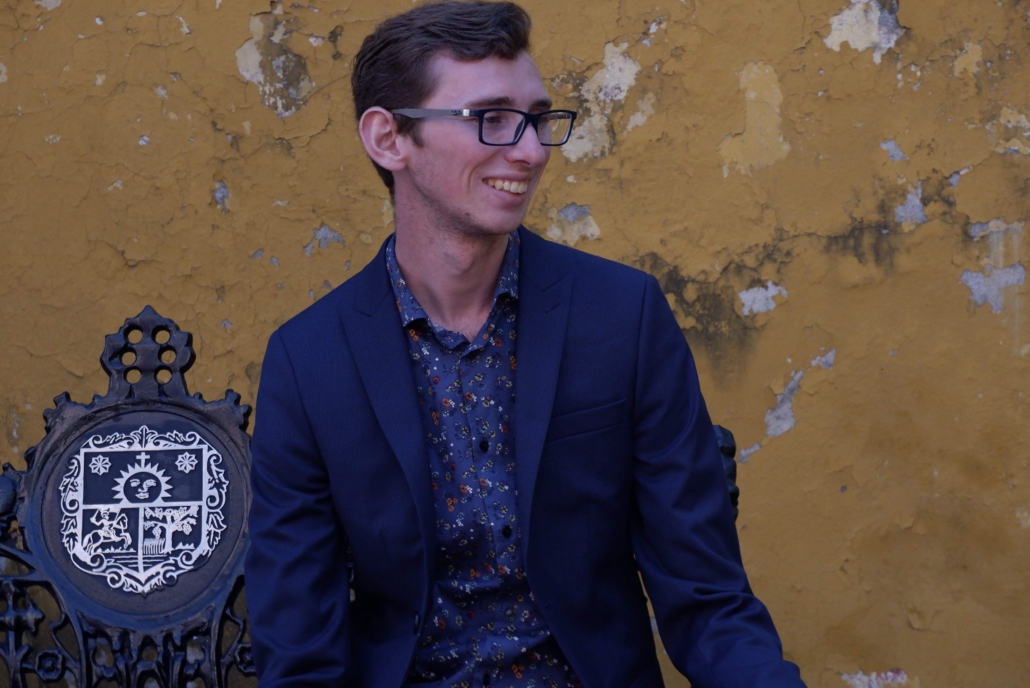Profile: Anthony Auchterlonie

When you have the opportunity to talk with Anthony about managing large research projects—with numerous moving parts, people, and goals—it becomes clear that what motivates him is a deep care for the lives, experiences and circumstances of others, and a belief that providing the right projects, programs and opportunities can lead to transformative impacts.
Anthony Auchterlonie is a former member of the Past Wrongs, Future Choices project office. From early December 2022 to early 2024, Anthony was PWFC’s interim project manager while Michael Abe was seconded to JC Legacies memorialization projects. Anthony’s journey with the project began with PWFC’s predecessor, Landscapes of Injustice, where he was a research assistant. During his time on Landscapes, Anthony gained firsthand experience liaising with archival repositories and working on experiential learning programs under the mentorship of Jordan Stanger-Ross and Michael Abe. As Anthony explains it, this is how he became introduced to some of the methods that have carried over to Past Wrongs, Future Choices, while also giving him valuable insight into “how different pieces and parts work” on large projects aimed at making important community-driven impacts by building historical and public knowledge.
What was it like being the interim project manager for Past Wrongs, Future Choices?
One of the first things Anthony learned was just how difficult it is to set up major research projects; he saw it as very important to learn how to manage various administrative processes as quickly as possible in order to make sure people were “getting what they needed when they needed it.” Being the interim project manager required, as Anthony notes, “a lot of communication” to effectively work within the confines of a project with an “absolutely massive scope” and “ambitious goals” hosted by a university with a complex bureaucracy. This work included being a main point of contact for “something like 87 different project partners around the world” and drawing together multiple design aspects, including some museum exhibits that are very nearly ready to launch. It’s also a balancing act between past, future and present dimensions of the project: being responsive to problems that emerge, big-picture forward planning to achieve project goals, and keeping things on track and accounted for in the present.
“I viewed my role as being a person in a position where ‘I move things’, and make sure people get what they need when they need it. My job is to facilitate: connection, communication and funding. It’s about giving people the resources they need to do the work that they love. That was what the job was about, as I viewed it.”
In addition to Anthony’s role with Past Wrongs, Future Choices, he has also recently completed his Master’s in the Department of Germanic and Slavic Studies at the University of Victoria in April 2024. His thesis focused on an analysis of Holocaust memorial culture in an attempt to respond to the TRC’s calls to action on memorialization as it pertains to the Indian Residential School System. Prior to this, Anthony spent his undergraduate degree learning across a variety of disciplines, ultimately completing a double-major in Environmental Studies and History with a minor in Political Science at UVic. This interdisciplinary background, and a passion for sensitively examining intersections of trauma and memorialization, brings an important perspective to how Anthony sees the projects he works on, and the impacts they make.
In Anthony’s wide-angled view of the project, he notes that PWFC’s residency program for scholars and artists is a unique aspect that might be “one of the most impactful parts of this project.”
“Projects like this, to me, are largely about capacity-building and providing opportunity to communities, to students, and to researchers. [This project has been set up to] provide structures and mechanisms that really allow people to take the time and the space necessary to do really important work. And the residency, and the success of the residency, shows that this method works. Scholars are coming, they’re meeting with artists, they’re interacting with these artists, and their perspective changes after these interactions. I think that’s what research programs should be aiming for. Very rarely is there the perfect program, but a residency program like this might be close. It’s occurring at the right time, in the right space—and right now, a generation of Japanese Canadian and international artists are questioning identity, history and narrative. This grant really allows them all to come into a safe space with support and mechanisms in place to do that work, and to build community with others doing this work.”
“With [2023 artist-in-residence] Kunji Ikeda describing it as an ‘ecosystem’, that’s exactly what it has become. I see it as almost a systems-based approach where everything is interconnected, because my background in environmental studies and ecology has trained me to view things as systems. So, I think that whether we know it or not, we are all interconnected in a myriad of ways that we don’t really truly understand, and the residency program really shows that.”
Following the conclusion of his term as Acting Project Manager with Past Wrongs, Future Choices, as of January 2024, Anthony has been managing a large multi-year project funded by the Law Foundation of BC titled “Next Steps: Rebuilding Indigenous Legal Orders” which is led by Dr. Val Napoleon out of UVic’s Faculty of Law.
Anthony remains connected to the PWFC team and community, and is excited to see how the project develops moving forward.
This article was written by Sarah Stilwell from a July 2024 interview with Anthony Auchterlonie.

 Instagram
Instagram